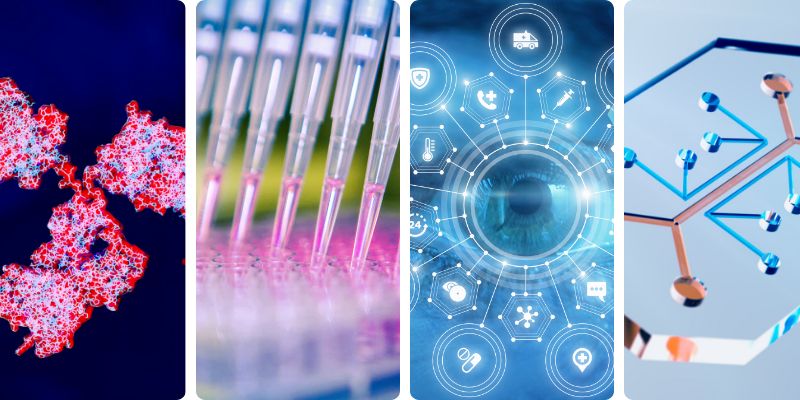
Fundraising for Vivodyne to fill one of the biggest gaps in drug discovery, new colon organoids increasingly resemble healthy, diseased colons, and more
News on non-animal methods
Nov. 27 - Dec. 1, 2023This Startup Raised $38 Million To Fill One Of The Biggest Gaps In Drug Discovery
Khosla Ventures-backed Vivodyne is growing human tissues in the lab to test potential new therapies before they go to clinical trials.
Only about 10% of drugs in development ever make it to market. That number has remained largely unchanged since the early 1990s, despite milestone advances in science — genomics, automated systems for conducting experiments and artificial intelligence. One big reason : lab research models that can’t accurately capture how drugs will behave in an actual person. That’s something that needs to change as multiple failures are one of the biggest reasons why it can potentially cost more than $2 billion to develop a single drug.
Vivodyne is building human organ tissues in the lab that can be used for preclinical testing of potential drugs, as well as AI systems that can rapidly collect and analyze data from those tests. It’s a replacement, he said, for the large-scale, single cell lab models or animal testing that dominate the market today, which enable large-scale screening for treating infectious diseases or certain cancers, but they’re also labor intensive and not as useful for more complex diseases. On Wednesday, the company announced that it has raised a $38 million seed round led by Khosla Ventures. Bison Ventures, MBX Ventures, Kairos Ventures and CS Ventures also participated in the round.
New colon organoids better resemble both healthy and diseased colons
Researchers have developed organoids with naturally occurring early-stage immune cells, which could lead to effective personalised treatment.
Medical University of South Carolina (MUSC) and Cincinnati Children’s Hospital researchers have created a model for studying the diseased colon. This could lead to the development of personalised treatments for colon-related diseases, like cancer and inflammatory bowel disease (IBD).
Methods for studying colon diseases, like colon cancer and IBD, have been restricted to cells and animal models until recently. Often, cells are extracted from cancerous tumours, decreasing their applicability to the study of non-cancer diseases. Also, treatments in animal models sometimes do not provide the same benefits to humans.
Organoids, three dimensional (3D) groups of cells that mimic organ functions, are much more complex than human cell cultures. However, they lack features of complete human organs and unlike animal models, are not connected to an entire body system.
To overcome this, Dr Munera, Dr Wells, and their colleagues induced these next-generation organoids to develop early-stage immune cell types, which reside in colon tissue naturally.
National Institutes of Health (NIH) researchers unlock pattern of gene activity for ADHD
New study uses postmortem brain tissues to understand genomic differences in individuals with attention deficit hyperactivity disorder.
To date, this is the first study to use postmortem human brain tissue to investigate ADHD. Other approaches to studying mental health conditions include non-invasively scanning of the brain, which allows researchers to examine the structure and activation of brain areas. However, these studies lack information at the level of genes and how they might influence cell function and give rise to symptoms.
Researchers at the National Institutes of Health have successfully identified differences in gene activity in the brains of people with attention deficit hyperactivity disorder (ADHD). The study, led by scientists at the National Human Genome Research Institute (NHGRI), part of NIH, found that individuals diagnosed with ADHD had differences in genes that code for known chemicals that brain cells use to communicate. The results of the findings, published in Molecular Psychiatry, show how genomic differences might contribute to symptoms.
Over 300 South Korean academic and industry experts urge the passage of bills promoting better science without the use of animals
Humane Society International/Korea
and 346 South Korean academic and industry experts delivered a letter to the chair of National Assembly’s Health and Welfare Committee, Dong Kun Shin, urging the Korean government to pass bills promoting state-of-the-art science replacing animal testing.
With an increasing consensus among scientists recognizing the importance of providing systemic support in developing and implementing human-based non-animal methods, two bills were introduced at the National Assembly ; the Act on the Promotion of Development, Dissemination and Use of Alternatives to Animal Testing Methods (PAAM Act), sponsored by Assembly member In-Soon Nam in 2020, and the Act on the Vitalization of Development, Dissemination, and Use of Alternatives to Animal Testing.
Patient derived organoids (PDOs) represent a promising tool for personalized treatment in drug discovery.
In the app note of Molecular Devices, they used a proprietary method for generating highly standardized, assay ready PDOs, and demonstrated their utility in high-throughput applications using colorectal cancer (CRC) PDOs.
These tumor organoids are multicellular mini replicas of the 3D tumor and have been shown to retain in vivo characteristics and their derived organoids respond similarly to drugs. However, challenges such as assay reproducibility, scalability, and cost have limited the use of PDOs in mainstream drug discovery pipelines.
Treated with selected anti-cancer drugs at various concentrations, the PDOs were monitored over time using transmitted-light imaging, and a deep learning-based image segmentation model was developed to analyze PDO size, texture, intensity and other morphological and phenotypic readouts.
Advances in in vitro modeling of lung diseases : Focus on precision-cut lung slices (PCLS) model
Tuesday, December 5, 2023 from 10:00 AM to 11:00 AM EST
The webinar is presented by Dr. Hanan Osman-Ponchet is the accomplished Founder and CEO of PKDERM, a leading French biotech company specializing in innovative in vitro solutions for assessing the efficacy and safety of pharmaceutical and cosmetic products. She holds a PhD in Biochemistry and has 20 years of experience in drug development at Sanofi.


